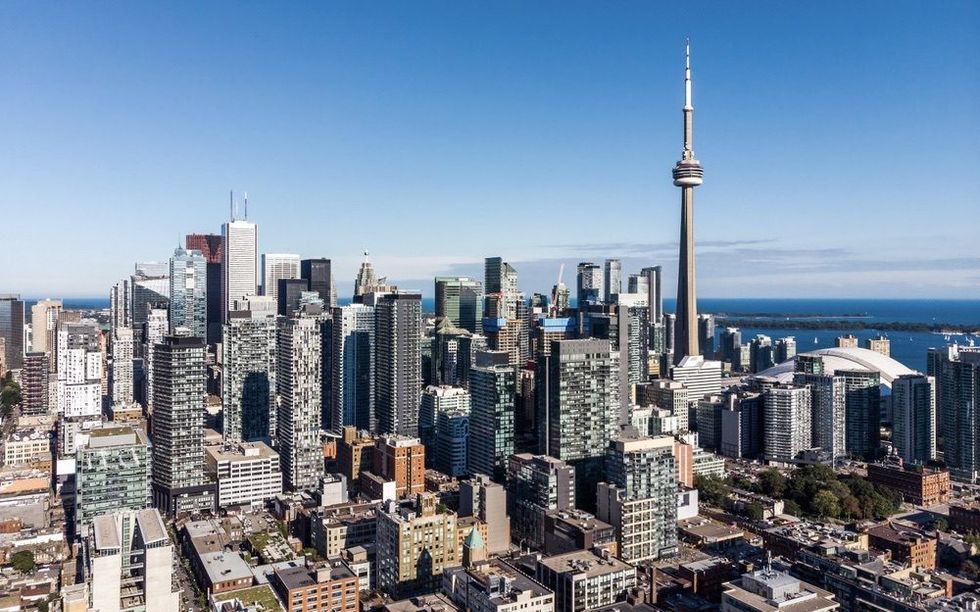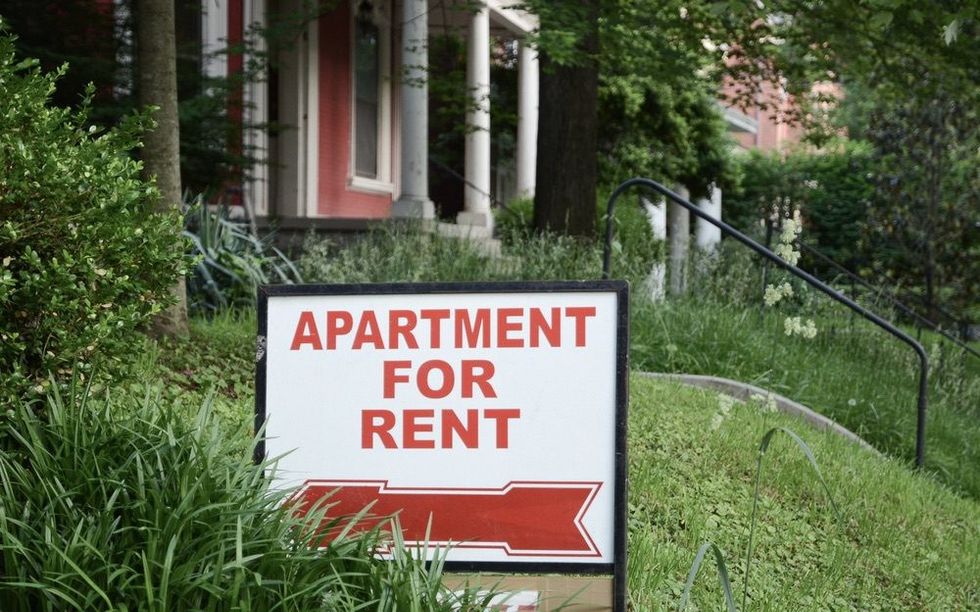“Tenants should be on their best behavior,” says Toronto-based realtor Dalle Morrison. “Because, if they’re making life difficult for their landlords, the landlords may say, ‘You know what? It’s now costing me all this money a month to carry this property and this person isn’t being very nice, so I may just throw in the towel.’”
When the Bank of Canada raised its overnight rate last week 25 points to 5% — the tenth rate hike from Canada’s central bank since March 2022 — countless Canadian homeowners found themselves having to re-evaluate their household budgets in order to now afford higher mortgage payments.
But the interest rate hikes will also have a ripple effect on Canada’s rental market, putting pressure on an already fragile (see: crisis level) situation for renters, especially in cities like Toronto and Vancouver.
Average rents in Canada hit a record high in June of $2,042 according to the latest National Rent Report from Rentals.ca and Urbanation. Even rents for “roommate accommodations” are up 15% from June of last year.

In the notoriously pricey Greater Toronto Area (GTA), rents continue to climb to jaw-dropping levels. According to the report, Toronto saw a nearly 16% annual increase for condos and apartments in June. The average rent for a one-bedroom in Toronto is now a tough-to-swallow $2,572. This figure includes everything from basement apartments to new condo developments.
Will Homebuyers Stay Put in the Rental Market?
Some experts believe that high interest rates will keep would-be homebuyers in the rental market, adding more pressure to a climate of low rental vacancy rates, sky-high rent prices, and consistently high demand for units in cities like Toronto.
“Raising interest rates [25 basis points to 5% last Wednesday] will cause more would-be homeowners to stay on the sidelines, which means some folks will rent longer until interest rates come down,” says Paul Danison, content director for Rentals.ca. “This adds to an already tight supply in places such as Vancouver, with a vacancy rate of under 1%, and Toronto, with a vacancy rate of 1.7%. Canada’s vacancy rate is not healthy at under 2%, according to the Canada Mortgage and Housing Corporation, so the pressure is felt all over the country.”
Danison says that people who might want to move from a smaller first home into a bigger home to expand their family will stay put, which may keep more starter homes out of the market. “It’s a domino effect,” he says.
Though he’s quick not to speculate, Kevin Hughes, Deputy Chief Economist at the Canadian Mortgage and Housing Corporation (CMHC), also says rising interest rates could potentially keep more would-be buyers in the rental market. “Borrowing has become more expensive, so that will have an impact on people who are either thinking about buying a home or who already have a home and have to refinance it, especially those with variable mortgages,” said Hughes. “That indirectly could put additional demand on the rental market. We don’t have a precise gauge on this, but it’s reasonable to think that.”
Morrison, however, says that people are still buying in Toronto, despite the rate hikes. “I actually think that a lot of renters are coming off the sidelines right now and are looking to buy because they’re sick of paying high rents,” she says. “I recently sent around some postcards in my area of midtown Toronto for a two-bedroom condo listing and was shocked at how many renters were calling looking to buy.”
So, even though interest rates — and home prices — remain relatively high, renters are still looking to enter the housing market, she says.
“If it’s going to be your principal residence, you only need to have a 5% down payment,” says Morrison. “A lot of people are going to spend $1M, so they will be ok looking for a place to buy. Yes, rates are higher now, but if we look at what rates were 20 years ago, they’re not that high. We have this recent memory, where we think rates are so high, but historically speaking, they really aren’t. We’ve seen rates as high as 13% and 20%.”

Landlords Could Feel the Strain
Of course, climbing interest rates mean that landlords with variable rate mortgages may now be having to pay more each month to carry their rental properties. For those with units protected by rent control and occupied by long-term tenants (who aren’t going anywhere any time soon), this could prove to be a major financial strain.
Looking to offset the higher mortgage payments, landlords will inevitably try to pass off costs to tenants, raising rents as much as they are legally allowed. For those in need of a refresher, GTA landlords are allowed to raise rent prices by 2.5% per year. There is an exception, however — and it’s an important one to note if you’re currently in the market for a rental: Newer buildings that were first occupied in or after November 2018 are not subject to rent control of any kind.
Currently, judging from recent conversations, some GTA landlords are taking full advantage of this ability, in some cases jacking rents as much as 30% (yikes). For older buildings, only when the unit is turned over may the landlord raise the rent for the new tenant.
Landlords who are losing money each month, however, will sell their properties, says Morrison. “There will be more landlords who want to sell their places,” said Morrison. “I already have a listing coming out this week where that’s exactly the case. I’ve heard from other agents as well that their landlord clients are feeling the squeeze a little bit too much, so they want to put their places on the market. That puts the tenants back into the musical chairs of trying to find a place to live, because there are fewer and fewer rentals available.”
For the landlords who decide to hold on to their properties, they need to be at least breaking even. “As long as a landlord is making any profit, chances are, they’re going to keep the place,” said Morrison. “It’s the landlords who are having to pay an additional $200, $300, or $500 a month to own the place because the rent doesn’t cover the mortgage payments, their maintenance fees, and the property tax. Those are the landlords who sell. Historically [in Toronto]if you made a profit of $100 a month, that was considered good.”
Daniel Walters owns a Toronto bungalow, which he has rented out in various forms throughout the years, including leasing single rooms to students. “I was running on fumes with rate increases last year, but luckily refinanced recently with a fixed mortgage before the last round of rate hikes,” says Walters. “But the general increase in rents allowed me to get $1500 for a room upstairs and $1000 for one in the basement with relative ease.”
Walters also says he bought long ago enough that he’s not feeling the same pressure as he imagines many are. “My neighbor across the street just did a big reno and refinanced with a high variable rate in the hope that rates would decrease and they’re hurting,” says Walters. “They’re forced to rent out part of their house ASAP to compensate.”
Hughes highlights that there are different types of landlords in the real estate landscape. “You have to look at their portfolio,” said Hughes. “There are landlords who own duplexes and triplexes, and there are some larger companies who own entire apartment buildings. All of these owners are faced with important decisions right now. An important factor in the attraction of a rental building is the cap rate. When vacancies are low, it’s going to affect the cap rate and make the building more alluring to investors. It’s difficult for owners in some big cities to completely transfer the cost to maintain or renovate their buildings because of the rent increase guidelines. We’ve heard over again from owners and landlord associations that owners are incapable of taking 100% of their repairs or renovations to their next leases, so when rates are rising, that compounds those expenses.”
Toronto-based realtor Brent Mangano says that he’s noticed a large volume of tenant-occupied condo listings on the market right now. “Most of these existing leases are on terms well below market value, and present a major issue for a potential buyer or investor,” he says. “So, they’re not selling.”

Renters Have Cause For Concern
Renters who are displaced by the sale of their landlord’s investment property will find themselves in a market of unattainable rent prices and many may have to downsize — or downgrade — for a higher price as a result, says Hughes.
According to Morrison, even those renters protected by rent cap limits have cause for concern. “For the renters who are protected by rent control and have had their place for years, someone’s paying somewhere,” says Morrison. “Yes, you hope your landlord has owned it for a long time, so you hope everything is ok. But you don’t know if a landlord has a line of credit on that property and maybe things aren’t ok.”
This is why Morrison advises renters to maintain as positive a relationship as possible with their landlords. “There’s nothing you can do if your landlord wants to sell,” she says. And being tossed back into the rental pool will certainly come as a rude awakening for renters in cities like Toronto and Vancouver.
Rising Rates Impact Everyone
While rates rise clearly hurt young first-time homebuyers, they have a ripple effect that impacts everything from the stock market to commercial businesses and the rental market.
“When interest rates go up, they affect everybody,” says Morrison. “And they affect everybody in different ways, and people don’t even realize how they’re being affected by it.”
Rates aren’t expected to drop drastically any time in the near future either.
“I can understand the Bank of Canada wants to keep inflation in check, but the cumulative effect of all the interest rates hikes last year and this year puts a damper on anyone trying to borrow money to buy a home, for investors to build housing, and for landlords to fix up apartments,” says Danison. “I think the Bank of Canada, before thinking about raising the interest rate again, should consider if inflation is a bigger problem than the housing crisis in the country. Inflation in Canada has slowed to 3.4%, the lowest it’s been in about two years.”*
No Rental Relief In Sight
High interest rates or not, the odds of there being any price relief in the rental market in the near future appears bleach. Hughes says that the CMHC’s annual October survey of rental markets across the country will offer a more telling indication of the state of the country’s rental market.
When we look at what’s on the horizon, Hughes highlights that the main drivers of rental demand are the job market and immigration. “Those indicators are showing strong numbers, so it’s reasonable to assume we will continue to be tight, and that will have an impact on rent prices,” he says.
With record-breaking immigration targets and already low levels of supply, rent prices will remain elevated. “There are also temporary residents like students,” says Hughes. “We expect vacancy rates to remain low. The interest rates may be part of that story, but it’s not easy to determine to what degree.”
On the supply side, Hughes highlights how higher rates could cause more delays for developers to bring their buildings to fruition, especially at a time when construction costs were so high. “This increase in rates is a direct consequence to the inflationary context in which we’re in,” says Hughes. “For people who want to build rental housing, or to renovate and repair existing rental housing so far as they need financing, that could have an impact on rents as well.”
*Canada’s latest inflation numbers were released this morning, with the rate falling to 2.8%, it’s lowest level in more than two years.
